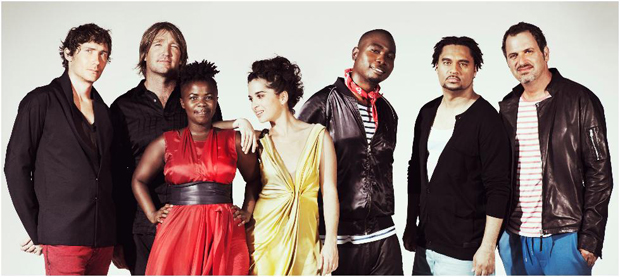Index relies entirely on the support of donors and readers to do its work.
Help us keep amplifying censored voices today.

Caster Semenya and Oscar Pistorius in 2012 (Photos: Jordi Matas / Demotix)
Caster Semenya carried the South African flag at the opening ceremony of the 2012 London Olympic Games; Oscar Pistorius waved it at the closing. Sandwiched between them was one medal, Semenya’s silver, one story of triumph over adversity, Pistorius, who is disabled after having both his legs amputated as a child ran with able-bodied athletes and proof that the country known as the Rainbow Nation does have some pots of gold.
Not even two years have passed since then and both flag-bearers have made the news for something other than sport. Pistorius has been on trial for the murder of his girlfriend Reeva Steenkamp, who was shot dead on February 14, 2013 while Semenya’s lovelife has come under scrutiny. For both, the glory has turned into an uncomfortable glare with the spotlight shone on their most intimate moments.
The Pistorius trial is a first for South Africa because it has been covered on television in full. All proceedings have been broadcast on a specially-created channel on the satellite service DSTV although witnesses could choose if they wanted to be filmed while giving testimony. After the live feed, the focus would shift to a dissection and analysis of the day in court.
On May 14, statistics revealed the Oscar Pistorius Trial TV Channel was the fourth most watched channel on pay-television in South Africa. It is also the most successful pay TV channel ever launched in the country’s history, employs 180 freelance producers, reporters, researchers and presenters and has attracted audiences at all times of the day, even the traditionally quiet period in the mid-morning and mid-afternoon.
The success of the channel has also led to speculation the upcoming murder trial of Shrien Dewani, the Bristol-based businessman who was extradited to face charges of plotting the hijacking and shooting of his wife, Anni while on honeymoon in Cape Town in 2010, will be televised in the same fashion. South Africans, who live in a country where three women are killed every day by their partners, have shown an appetite for courtroom drama.
During the Pistorius trial viewers were able to watch the athlete retch into a bucket as he heard testimony about the damage the four bullets he shot at Steenkamp caused, to hear him cry on the stand when shown a picture of her bullet-hit head and observe how the legal process takes place. It has even given coverage to the trial in the courtroom next door where a man, Thato Kutumela was convicted of killing his girlfriend Zanele Khumalo, which would otherwise not have made the news at all.
The Pistorius trial has already had one postponement, a two-week adjournment to accommodate for public holidays over the Easter period, but it is now set for a much lengthier one. Pistorius will spend 30 days as an outpatient undergoing psychological evaluation. A psychiatrist called by Pistorius’ defence team testified that he suffered from generalised anxiety disorder from a young age which could have diminished his capacity when he shot Steenkamp.
While Semenya’s mental state has not had reason to be examined, another aspect of her private life, her relationship, has. Earlier this week news broke that Semenya had paid lobola – the traditional bride price which is comparable to dowry – for her girlfriend, fellow athlete Violet Raseboya. When newspapers tried to confirm the story, Semenya refused to help them. “I really have nothing to say about that article,” she said. Irrespective of Semenya’s statement, many public comments have been laced with nastiness about Semenya’s sexuality and gender.
These are themes that have stalked the runner since her champagne moment in 2009, when as an 18-year-old she won the 800 metre race at the World Championships in Berlin. Instead of celebrating the gold medal she faced a barrage of accusation over her gender. Fellow competitors accused Semenya of being a man and her appearance, underlined by her short hair, strong biceps and washboard abdominal muscles, did not help that.
She was required to have her gender tested amid a wave of protests that the procedure was invasive. The results were never made public although it was revealed that she had neither a womb nor ovaries and high levels of testosterone. A year later, the International Association of Athletics Federations cleared Semenya to compete against other women but the stereotype remained.
With the spectre of the tests hanging over her and because Semenya did not look typically feminine, she was thought of as something “other.” The foregone conclusion was that she was homosexual and when media reports unveiled a girlfriend, through Drum magazine which used Facebook pictures of Semenya and Raseboya, there was a collective nodding of heads and growing of stigma.
Being black and lesbian is not easy anywhere in Africa, and illegal in some parts. Sisande Msekele, writing in Curve magazine explained. “In many black cultures being a lesbian is associated with witchcraft. Coming out as a black lesbian is to risk being called a witch, demon possessed, raped, disowned and killed.”
Semenya, who is a public figure, may not face the same dangers from her community and the close inspection of her private life will be inescapable but not illegal. Same sex marriages have been legally recognised in South Africa since December 2006.
This article was published on May 19, 2014 at indexoncensorship.org

Zimbabwe barred the South Africa band Freshlyground from entering the country.
Members of the South African band Freshlyground were denied entry to Zimbabwe just hours before they were set to play at the closing night of the Harare International Arts Festival (HIFA) last week. The county’s political leaders “have yet to find a sense of humour” the band said.
The group was turned away at Harare International Airport. They were told there was no official reason given or required for sending them back home.
The state-owned daily, The Herald, has subsequently quoted regional immigration officer Francis Mabika saying the band did not have valid work permits. However, organisers at HIFA confirmed in a statement that all the performers at this year’s festival, including Freshlyground, had made payment and received clearances from the National Arts Council, and had obtained temporary work permits.
It is believed the group’s 2010 song Chicken to Change, which accuses president Robert Mugabe of being too afraid to relinquish power, is the primary factor for Freshlyground being turned away even though the song is almost four years old. Days after it first hit airwaves, Freshlyground’s visas to perform at a concert at the Wild Geese Lodge in Harare were revoked. The Zimbabwean authorities do not seem to have changed their minds about the message in the music.
The catchy tune starts off praising Mugabe for being a “superhero” and “noble” in his early years but then takes a critical look at his rule. The accompanying video, which was made in collaboration with the satirical political cartoon show ZANEWS, features a caricature of Mugabe cruising the streets in a limousine, reading Bob’s Times and ignoring his surroundings, save for winding down his window when his car runs over a chicken to observe what appears to be poor people on the side of the road holding other chickens, and then rolling it back up.
Towards the end of the song, lead singer Zolani Mahola concludes with: “You promised always to open the doors for us. Indeed it is you and only you who sleeps with the key. You are chicken to change,” as Mugabe’s head transforms into a chicken’s in the back seat of the vehicle. The rooster is symbolic as it is on the logo of Mugabe’s party, ZANU-PF, which has ruled Zimbabwe for more than three decades but was also a way of depicting poverty in the country because poultry was used as a currency during hyperinflation.
In an interview with Public Radio International (PRI) Mahola explained the crisis in Zimbabwe during the mid-2000s inspired the band, which has one Zimbabwean member in flutist Simon Atwell, to write the song. “It’s been very obvious to see the degradation and how bad the situation is, and how fearful people had become, more and more, under the government of Mugabe. And so, we wrote the song,” Mahola said.
Their approach contrasts with the overall stance coming out of South Africa, especially from political figures, which has been to sidestep the Zimbabwean issue. Although South Africa is home to more than a million Zimbabweans who fled their homeland, the country’s politicians have refused to condemn Mugabe. Instead they have opted for quiet diplomacy, the term coined during Thabo Mbeki’s presidency, which essentially referred to ignoring the Zimbabwean problem.
The artistic corner has also been relatively silent on Zimbabwe apart from DJ Cleo, a kwaito performer, who was banned from performing in Bulawayo in 2006 after he questioned Mugabe’s economic management. Freshlyground, whose music is known for being uplifting and includes the 2010 World Cup anthem Waka Waka, are unlikely candidates to take up the cause but as their bass player, Josh Hawks, explained to PRI, they are willing to be advocates on occasion. “We’re musical-political as opposed to political-musical. But, we are affected by what goes on around us.”
Apart from a few tweets on their departure and a brief statement, the band have refused to comment further on the incident but assured supporters in Zimbabwe they remain committed to visiting the country again. Freshlyground had previously played in Zimbabwe at HIFA in 2004 and the National Arts Merit Awards in 2009 but have not been back since.
Their statement reads: “The band are hugely disappointed at the missed opportunity to return to one of their favourite performance venues, and is left saddened that once more Freshlyground were unable to connect with their fans in Harare. Freshlyground remain undeterred however, and hope that in the not too distant future will be allowed to celebrate a love of music and a freedom of expression with the people of Zimbabwe.”
HIFA’s director Manuel Bagorro called it a “sad day” for Zimbabweans and the festival organisers refunded tickets to the closing night, which were valued at £14 each. They also claim to have received an assurance from the government that the group would be allowed back into Zimbabwe in future.
Freshlyground was not the only source of controversy at this year’s HIFA. A play titled Lovers in Time caused a stir because the two spirit mediums from the 1800s switch sexes and race as they come back to modern Zimbabwe. The final showing of the play was delayed by half-an-hour and played out in with police present.
This article was posted on May 13, 2014 at indexoncensorship.org